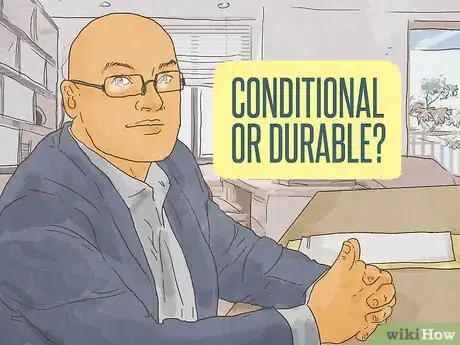This article was co-authored by Clinton M. Sandvick, JD, PhD. Clinton M. Sandvick worked as a civil litigator in California for over 7 years. He received his JD from the University of Wisconsin-Madison in 1998 and his PhD in American History from the University of Oregon in 2013.
There are 11 references cited in this article, which can be found at the bottom of the page.
This article has been viewed 82,344 times.
This article is written for persons in the United States. Powers of Attorney in other jurisdictions have different requirements, and are used for different purposes, so it is important for you to check the laws of your local jurisdiction if you are not living in the United States.
Adults who want their medical treatment preferences honored if they become incapacitated need to create legal documents that direct medical professionals on how they are to be treated. At the same time, they should also think about giving someone medical power of attorney. With this power, the agent makes medical decisions not specified in a living will. Sadly, people can suffer unexpected life-threatening injuries. But by creating a medical power of attorney, you can take control of your medical treatments should you become incapacitated. You will also gain peace of mind knowing that your wishes will be followed.
Steps
Preparing to Create the Medical Power of Attorney
-
1Determine whether you need a medical power of attorney. As a general rule, if you become incapacitated because of illness or injury, doctors will continue to provide medical treatment to keep you alive. If you want to direct the treatment you receive, then you will need to create legal documents that either spell out the treatment you want to receive or that designate someone with the legal authority to decide the issue for you.
- The first document is a “living will.” A living will spells out how you want to be cared for in the event you become incapacitated. It also might be called an “advance medical directive.”[1]
- Another option is the creation of Physician Orders for Life-Sustaining Treatment (POLST).[2] A POLST form will tell medical personnel how you want certain treatments to be administered in certain situations.[3]
- With a medical power of attorney, you designate someone to make medical decisions for you. This person is typically called your “agent,” “surrogate,” or “patient advocate.” A medical power of attorney picks up where the living will leaves off. Your agent will make medical decisions not covered in your living will, and will hire or fire doctors and enforce your medical wishes and court. Your agent will also have rights to visit you in the hospital and access your medical records.[4]
- For example, you might not have stated in your living will if you want to be put on a feeding tube. Should that become necessary to prolong your life, your agent will need to step in and decide whether or not to hook you up to the feeding tube.
-
2Draft your living will. You should make as many decisions for yourself as possible. Accordingly, you may want to draft a living will. In it, you will spell out what medical treatments you want to receive and what treatment you do not want to receive in the event you become incapacitated.
- Living wills often answer whether or not you want to receive treatment that will keep you alive but will not make you better. They also typically specify if you want to be put on a feeding tube.
- If you are not incapacitated, then you will continue to make medical decisions for yourself. Accordingly, you will not have to follow what you put in your living will.
- You can find living will templates on the web. An example of a simple living will is here. If you have questions, you should consult with an attorney.
- You may also want to fill out “Do Not Resuscitate” forms. These forms explicitly state whether you want to be resuscitated in the event of full cardiopulmonary arrest (when both breathing and heartbeat stop) or in the event of pre-arrest. Forms should be available from your state Department of Health or from area hospitals.
Advertisement -
3Fill out a POLST form. When you fill out a POLST form, you are indicating your wishes regarding treatments that are common in medical crises.[5] POLST forms are valid medical orders in many states, while other states do not recognize them at all.[6] Be sure you check with your state to make sure it has a valid POLST program.[7]
- To start, obtain a POLST form and fill it out completely. In Oregon, for example, the form can be found online and should be filled out with the help of a doctor.[8] The form works to direct medical personnel on whether you want CPR, medical intervention, and artificially administered nutrition.[9]
- In Oregon, your doctor must sign the completed POLST form for it to be valid.[10]
- Keep one copy, printed on pink paper, with you at all times.[11] In addition, send one copy to your state's POLST registry, which will create a secure copy of your POLST form for all medical personnel to see. If your pink paper copy cannot be found, medical personnel can look on this registry to find your form.
-
4Recognize the varieties of powers of attorney. You may hear “power of attorney” used in a variety of contexts. Each means something slightly different.
- A “springing” (or “conditional”) power of attorney becomes effective when some condition is met. For example, a springing power of attorney may state that it becomes effective only when you are incapacitated. A “durable” power of attorney, by contrast, becomes effective immediately.
- Medical power of attorney forms are invariably “springing”—that is, they specify that the agent will begin making decisions when you, “in the opinion of the agent and attending physician, are unable to make or communicate a choice about a particular health care decision.”
- You can create a “power of attorney” for almost any situation. If you are purchasing a home, you can create a power of attorney which authorizes someone to purchase the home subject to limitations. The other most common form of power of attorney is a “financial power of attorney,” where you give someone the power to make financial decisions for you.
-
5Consider who you should choose as your medical agent. Because your agent will be making decisions you have not made in your living will, you should choose someone whose judgment you trust. You also want someone who can capably fill the role. A good agent will:
- Be assertive. The agent will need to assert your wishes in situations where other family members may disagree. Accordingly, you need someone who can effectively advocate in the face of resistance.[12]
- Live nearby. The agent does not have to live with you or in the same town, but he or she will probably need to be close at hand during medical emergencies. Often, this person will have to stop into the hospital regularly over a long period of time. For this reason, you should choose someone who lives near you.[13]
- Not be prohibited by law. States prohibit certain people from serving as your agent. Typically, hospital employees and medical personnel who are treating you are excluded.[14]
-
6Meet with potential agents. You should meet with anyone you are considering naming as your agent and talk with them about it. In addition to asking if they are interested, you should talk a little bit about your wishes.
- If you already have a living will drafted, bring a copy so that the person can get an idea about what kind of treatment you want and don’t want.
-
7Consult with a lawyer. An experienced attorney can draft the medical power of attorney but can, more importantly, help you think through different medical scenarios and clarify what treatment you want. If you do not yet have a will, then a medical power of attorney can be drafted at the same time as a will and a living will.
- To find a qualified estate planning attorney to help you, you should contact your state’s bar association, which runs a referral service.
Drafting the Medical Power of Attorney
-
1Find forms. There are medical power of attorney form templates online. If you do not want to pay an attorney’s fees, then you can draft a medical power of attorney yourself. Every state should have forms that you can use. Look on your state’s Department of Human Services website.
- The American Bar Association also provides a “universal” form, which is accepted in all states except Indiana, New Hampshire, Ohio, Texas, and Wisconsin.
- You might also want to fill out a template yourself and then meet briefly with a lawyer to review it.
-
2Fill in the form. You should name only one agent, though you may also name an alternate. Naming more than one agent could create conflicts if the agents disagree about what medical care you should receive.[15]
- The form will ask for basic personal information: your name, date of birth, and the state where you are completing the form. Also, it will ask for information on your agent: name and address, phone number and email address. It will also for this information for your alternate agents.
- You will also be asked to provide specific instructions and limitations, such as treatments you do not want to receive. For example, you could specify that you do not wish to be resuscitated, receive surgery or medication, or have experimental treatments. You can also include this information in your living will.
-
3Have it witnessed. Your state may require that you have witnesses attest that you appeared to be in sound mind and signed the document of your own free will.[16]
- State rules differ as to who may sign. For example, in some states a spouse or relative who would inherit from your estate may not sign as a witness. Also, many states prohibit your attending physician from signing.[17]
- The form you fill out should state the limitations on who may sign as a witness.
-
4Have the form notarized. You need to have the form notarized, which means that you will take the form to a notary and sign it in front of the notary. Notaries are often found in banks but also at hospitals.[18]
- You will need to present valid personal identification to the notary, such as a driver’s license or a passport. Your witnesses must also have this identification. Be prepared to pay a small fee for the notary service.[19]
-
5Distribute copies of the form. After you have finalized the documents, you should distribute copies to those who will need them. Talk to your attorney about who needs a copy, but a partial list includes:
- your primary care physician and any specialist who treats you regularly
- those designated as your medical power of attorneys
- close family members or friends
- your lawyer
- the administrator of your assisted living facility
- any hospital or medical clinic where you receive treatment
-
6Update as necessary. You may need to update the form if the designated agent dies or tells you that he or she no longer wishes to serve in this capacity for you.
- You may also need to update if you get divorced, especially if you gave your spouse medical power of attorney.[20]
- To update, you can fill in a new power of attorney form. Or you can type of an addendum and staple it to your medical power of attorney document. However, you will need to sign any new form or addendum and also have it witnessed and notarized, otherwise changes will not be effective.
-
7Keep your form. There is no government office to send or store your completed medical power of attorney form. You must keep it in a safe but readily accessible location.
Warnings
- Your agent may receive compensation for expenses related to food, travel, and lodging for acting on your behalf. However, your agent is not automatically entitled to payment for his time spent working on your behalf. If you want your agent to be paid for his work, specify these details in your medical power of attorney paperwork.[21] [22]⧼thumbs_response⧽
- This article is intended as legal information and does not provide legal advice. If you need legal advice, contact a licensed attorney.⧼thumbs_response⧽
References
- ↑ http://estate.findlaw.com/living-will/the-definition-of-power-of-attorney-living-will-and-advance.html
- ↑ http://www.polst.org/
- ↑ http://www.polst.org/advance-care-planning/how-does-polst-work/
- ↑ http://estate.findlaw.com/living-will/the-definition-of-power-of-attorney-living-will-and-advance.html
- ↑ http://www.polst.org/advance-care-planning/how-does-polst-work/
- ↑ http://www.polst.org/programs-in-your-state/
- ↑ http://www.polst.org/programs-in-your-state/
- ↑ http://www.polst.org/wp-content/uploads/2013/01/Printing-POLST.pdf
- ↑ http://www.polst.org/wp-content/uploads/2013/01/Printing-POLST.pdf
- ↑ http://www.polst.org/wp-content/uploads/2013/01/Printing-POLST.pdf
- ↑ http://www.polst.org/wp-content/uploads/2013/01/Printing-POLST.pdf
- ↑ http://www.nolo.com/legal-encyclopedia/choosing-health-care-agent-29939.html
- ↑ http://www.nolo.com/legal-encyclopedia/choosing-health-care-agent-29939.html
- ↑ http://www.wvlegalservices.org/medpoa.pdf
- ↑ http://www.nolo.com/legal-encyclopedia/choosing-health-care-agent-29939.html
- ↑ http://www.nolo.com/legal-encyclopedia/finalization-requirements-health-care-directives.html
- ↑ http://www.nolo.com/legal-encyclopedia/finalization-requirements-health-care-directives.html
- ↑ http://www.nolo.com/legal-encyclopedia/finalization-requirements-health-care-directives.html
- ↑ http://www.nolo.com/legal-encyclopedia/finalization-requirements-health-care-directives.html
- ↑ http://healthcare.findlaw.com/patient-rights/do-i-need-a-lawyer-to-write-a-durable-power-of-attorney.html
- ↑ http://info.legalzoom.com/can-power-attorney-charge-expenses-24313.html
- ↑ https://www.agingcare.com/Articles/things-you-can-and-cant-do-with-poa-152673.htm
About This Article
Medical power of attorney gives someone of your choice the ability to make medical decisions for you. There are 2 main types of power of attorney in the U.S. A springing or conditional power of attorney becomes effective when you become incapable of making your own decisions, while a durable power of attorney becomes effective immediately. Look on your state’s Department of Human Services website for medical power of attorney forms. Once you’ve filled out the form, you’ll need to get it witnessed and notarized. Then, send copies to your primary care physician, your close family and friends, and any hospitals where you currently receive treatment. For more tips from our Legal co-author, including how to tell your doctors how you want to be treated, read on.







































































